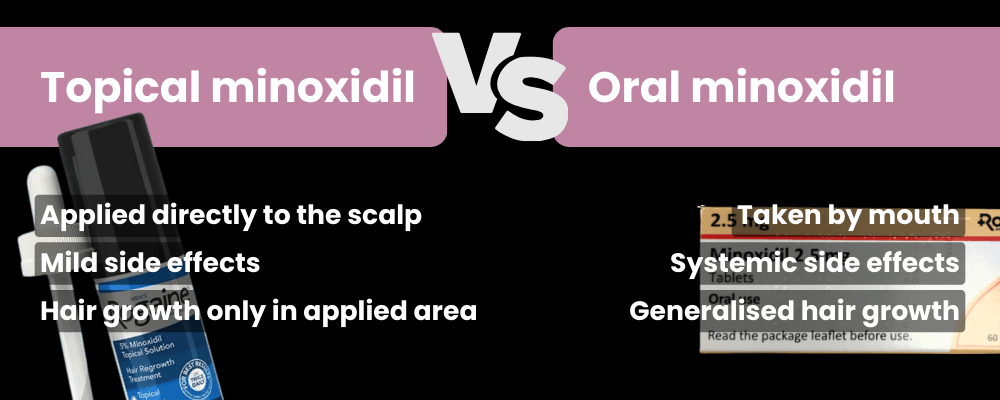Oral minoxidil is a medication originally developed to manage high blood pressure, but it has gained recognition as a potential treatment for hair loss. Unlike topical minoxidil, which is applied directly to the scalp, oral minoxidil is taken in pill form.
It dilates blood vessels, increasing blood flow throughout the body, including the scalp. This improved circulation can stimulate hair follicles, potentially leading to thicker and stronger hair growth. Oral minoxidil is particularly effective in addressing androgenetic alopecia (male and female pattern baldness).
How oral minoxidil Works
- Ingestion: Oral minoxidil is taken as a pill, typically at a prescribed dosage, under the supervision of a healthcare professional. You can purchase it directly from The Family Chemist.
- Blood circulation: The medication is absorbed into the bloodstream through the digestive system after ingestion.
- Systemic effects: Oral minoxidil’s primary function is to dilate blood vessels, leading to a general increase in blood circulation throughout the body, including the scalp.
- Improved scalp blood flow: This enhanced blood flow reaches the scalp, which houses the hair follicles responsible for growth.
- Follicle stimulation: The increased blood flow can stimulate hair follicles in the scalp. While the precise mechanism is not fully understood, it is believed to activate dormant follicles and promote the growth of thicker and stronger hair.
- Hair growth: Over time, with consistent use and under the right conditions, oral minoxidil may improve hair density and thickness.
It’s important to note that oral minoxidil’s effectiveness can vary among individuals, and results may take several months to become noticeable.
Effectiveness:
- Studies suggest oral minoxidil can be more effective than its topical counterpart for specific individuals.
- It’s often considered when topical minoxidil alone has not yielded the desired results.
Usage and dosage:
Oral minoxidil is prescribed for conditions such as high blood pressure and hair loss. Oral minoxidil, in low doses, is presently employed as an off-label remedy for hair loss. The primary worry with using minoxidil tablets for hair loss is the possibility of negative systemic impacts. However, recent research indicates encouraging outcomes with the utilization of low-dose oral minoxidil (ranging from 0.25 to 5 mg/day) in treating alopecia, with a focus on minimizing side effects.
- Typically, the starting dose of oral minoxidil for hair loss is 1.25mg milligrams (mg) once a day for 14 days and if tolerated the dose is increased to 2.5mg daily.
- Consistency in taking the medication as directed is crucial for the effectiveness of oral minoxidil. It’s important to note that results may not be immediately noticeable, and it may take several months of consistent use to see improvements in hair growth.
Patients should also be aware of potential side effects and promptly report any unusual symptoms to the Family Chemist clinician.
Oral minoxidil vs topical minoxidil
- Systemic effect: Unlike topical minoxidil, which is applied directly to the scalp, oral minoxidil works systemically throughout the body. It dilates blood vessels, increasing blood flow, which can benefit hair follicles on the scalp and other areas.
- Potency: Oral minoxidil is often considered more potent than its topical counterpart for some individuals. It may be recommended when topical treatments have not yielded satisfactory results.
- Convenience: Taking oral minoxidil in pill form eliminates the need for daily application to the scalp, making it a more convenient option for some people.
- Potential for thicker hair: The improved blood flow to the hair follicles may lead to the growth of thicker and stronger hair, providing a fuller appearance.
- Long-term use: Oral minoxidil can be a long-term solution for managing hair loss, allowing individuals to maintain their results over time.
- Combining with other treatments: It can be used with other hair loss treatments, such as finasteride, for a more comprehensive approach to hair restoration.
- Individualised dosage: Healthcare providers can tailor it to an individual’s needs and monitor its effects, ensuring a personalised treatment plan.
- Off-label use: While oral minoxidil’s primary indication is for high blood pressure, its off-label use for hair loss has provided an alternative option for those seeking hair restoration.
It’s important to note that oral minoxidil may not suit everyone, and a healthcare professional should carefully monitor its usage. Potential side effects and individual responses to treatment should be considered when deciding on its suitability as a hair loss solution. Consulting with a healthcare provider is essential to determine if oral minoxidil is the right choice for an individual’s circumstances.
Possible side effects:
As with any medication, oral minoxidil has potential side effects. These include:
- Cardiovascular Effects: Minoxidil can cause fluid retention and heart palpitations. It’s also known to potentially cause or worsen heart failure due to its action on the cardiovascular system.
- Hypertrichosis: Excessive hair growth in areas other than the scalp, such as the face and body, can occur. This is more common in women.
- Blood Pressure Changes: Since it’s a potent vasodilator, it can significantly lower blood pressure. This might result in symptoms like dizziness or fainting, especially when standing up quickly.
- Breast Tenderness and Changes: Some people have reported changes in breast tissue, including tenderness.
- Skin Reactions: Rashes or other skin reactions can occur, though these are less common with oral use compared to topical application.
- Gastrointestinal Issues: Nausea, vomiting, or abdominal pain may occur in some individuals.
- Other Systemic Effects: Fatigue, headache, and even swelling of the extremities due to fluid retention are possible.
- Weight Gain: Due to fluid retention, users might experience a sudden increase in weight.
It’s important to note that the risk and severity of these side effects can vary depending on the individual. Patients with certain medical conditions, or those taking other medications, may be at increased risk of side effects.
Start your hair loss journey today
In conclusion, oral minoxidil is a promising option for individuals seeking practical solutions for hair loss. While it may not suit everyone, it offers an alternative to topical minoxidil, particularly for those who prefer systemic treatments. To learn more about this topic or explore hair loss treatment options, contact The Family Chemist, your trusted online pharmacy in the UK.
Contact our experts today
Contact The Family Chemist today if you’re considering oral minoxidil or have questions about hair loss treatments. Our team of experts is here to provide personalised guidance and support on your journey to healthier, fuller hair.
Minoxidil FAQs
Q1: Does minoxidil regrow hair?
Yes, minoxidil has been clinically proven to promote hair regrowth in many individuals. It’s particularly effective in treating androgenetic alopecia (male and female pattern baldness). However, results can vary from person to person.
Q2: Is minoxidil good for your hair?
Minoxidil can benefit individuals experiencing hair loss, stimulating hair follicles and promoting hair growth. However, its effectiveness depends on various factors, including the cause of hair loss and individual response.
Q3: Are there side effects to minoxidil?
Yes, there can be side effects associated with minoxidil use. Common side effects include scalp irritation, itching, and dryness. In some cases, individuals may experience more severe side effects like heart palpitations or dizziness.
Q4: Is minoxidil available on NHS?
Minoxidil is not typically available on the NHS (National Health Service) for hair loss treatment. In most cases, individuals would need to purchase minoxidil products over the counter or with a prescription from a healthcare provider.
Q5: How long does it take to see results with oral minoxidil?
Hair growth results can vary among individuals, but some may notice improvements after a few months of consistent use. It’s essential to be patient and continue treatment as prescribed.
Q6: Can oral minoxidil be used as a standalone treatment for hair loss?
Oral minoxidil can be used as a standalone treatment, but it’s often considered in combination with other hair loss treatments for enhanced results. Your healthcare provider can advise on the best approach for your specific situation.
Q7: Can I buy oral minoxidil without a prescription?
In most cases, oral minoxidil requires a prescription from a The Family Chemist Clinician. Please fill in the free online consultation for a thorough evaluation of your medical history.



